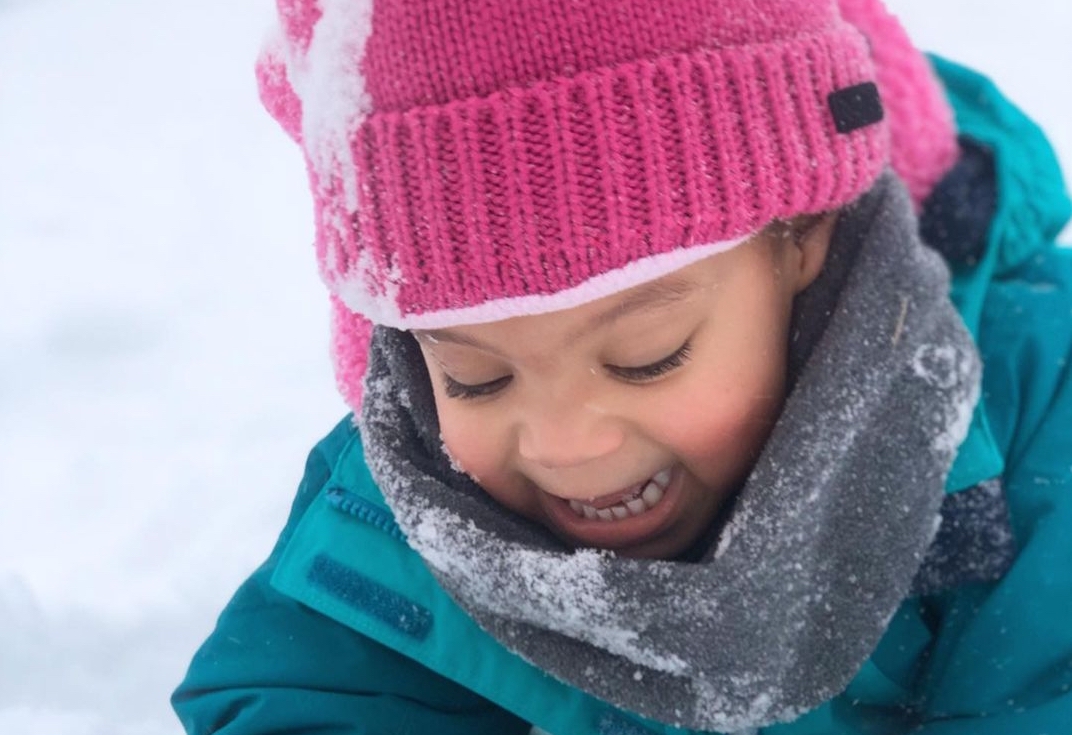By design, winter is a time of rest for the natural world. Plants and animals in all different climates slow down in winter and benefit from the chance to restore. Even most cacti won’t set flowers if they do not get their winter break.
Winter also offers unique sensory experiences that, when you slow down to take them in, are wildly inspiring. Even through it's a stretch to "delight" in nature when it’s terribly cold out, we grow more resilient when we learn to manage challenging conditions—lessons kids can (and will need to) transfer to other parts of their lives.
Here in our culture, misconceptions have rebranded winter as the season to stay indoors. On the surface it makes sense—animals hibernate, so humans follow suit and stick inside the house. But, no matter how animals rest in winter, they are never disconnected from nature—they simply shift their approach. Nature remains where they belong, and it’s where we belong too.
We can't lose winter for our kids
We can’t afford to keep our kids indoors and inactive. Studies show that kids today spend 50% of the time we did outdoors. Kids have also lost 12 hours of play time out of each week since 1970— a huge loss. As a nation, we gave ourselves a D- on our US Report Card on Physical Activity for Children and Youth with more than ¾ of our kids failing to get the minimum required daily physical activity.
Worse yet, the increase in sedentary, indoor lifestyles coincides with increases in many chronic childhood health conditions, including childhood obesity, asthma, attention deficit disorder and vitamin D deficiency. Kids have already lost so much time for healthy play outdoors; how can we take 25% of what is left away by eliminating an entire season?
There is so much reason to hope, and the answer is right outside our doors. While alarming trends continue to increase, the evidence that exposure to nature and play directly benefits health continues to mount.
Just a few of the wellness benefits of outdoor play:
Kids who spend more time outdoors are more physically active, and there is no shortage of research that physical activity drives positive health outcomes.
“To be healthy, children need several hours (not minutes!) of movement a day — preferably outdoors, where the senses are fully alive and their bodies are free to move in many different ways.”—Angela Hanscom
Doctors also know daily doses of fresh air and sunlight increase circulation, vitamin D, boost immune systems, and promote overall wellness. We parents know it too when we look at happy kids who sleep soundly and just look healthier.
Time spent in natural settings also contributes to healthy sleep patterns in babies, toddlers, and kids. And, proper sleep drives all kinds of beneficial health outcomes.
Kids who spend time outdoors get sick less often. The perception that you’ll catch a cold outside is just plain wrong. Stagnant, indoor environments are breeding and sharing grounds for all kinds of germs, and some studies show that being cold may even trigger the immune system.
"It is not only medically sound, but plain common sense that running around outside in the winter is far more beneficial than being cooped up indoors." — Dr. Michel Cohen, Author and Founder of Tribeca Pediatrics
Nature and play lower stress. Time spent in natural settings is restorative and reduces anxiety for kids and for adults. Children are particularly vulnerable to the impact of stress and stress hormones, and this time is extra stressful on us all. Plus, if you can join your kids, your stress will reduce too, making it easier to provide a more supportive environment for kids.
Nature and play bring joy: Learning to find and experience that joy is another way to give children enriching, positive emotional experiences that they can carry forward into the world.
Learning to Persist
Play in the cold gives kids chances to learn to persist. Winter gives kids the opportunity to learn that they can manage when life gets a little challenging. And that doesn't only mean through "toughing it out" in the cold. It also means through finding ways to adjust and adapt to enjoy nature during the winter season. We may adjust our attitude, our gear, the time of day we spend time outdoors, the setting, or the amount of movement we use to stay warm. On certain days, we may even decide to bring nature indoors.
As we help kids embrace the challenges winter brings and adapt their approach, they get the message that they have the resources to persist and make the best of whatever life hands them. There may not be two more important capacities kids today need for long term wellness than persistence and resilience --and no more natural way to give it to them than winter play outdoors.
Join us this winter at Tinkergarten for our Winter/Animal Superheroes curriculum, designed to promote persistence! There are three ways to bring this learning to the kids you love or teach:
- Find a local teacher to learn with.
- Follow along with Tinkergarten Home
- Or teach weekly lessons designed to provide kids with wonder-boosting, age appropriate challenges. Learn more.
Is There Such a Thing as Too Cold?
Although we largely ascribe to the Scandinavian saying, "There is no such thing as bad weather, only bad clothing," we nevertheless believe that there are extremes in which outdoor learning is too challenging to support safely. To understand how manage the winter weather extremes on our Weather Watch page. Kids also need proper gear! Keep reading or check our Winter Gear Guide for more gear ideas and tips.
On board with cold-weather outdoor play?
Commit to winter outdoors by trying to get outside every day this winter, even if just for a little while. Find a play group or even just one other family that wants to join you in getting out each day. Set a goal for how many days, hours, hikes, etc. you'd like to complete this year. Or, just aim to get regular, meaningful time outdoors every week this winter. The great news? Research tells us that we humans start to get the myriad benefits of time outdoors from as little as 2 hours per week…that’s less than 15 minutes a day!
Is more time than that better? Maybe—but it’s really up to you.
However you find the winter mindset that works for you, spread the word! If we all flood social spaces with images of healthy, active time spent playing outdoors this winter, we will shift culture and counter misconceptions. We’ll help you amplify your efforts too—post about your winter play experiences on Instagram and tag @tinkergarten so we can share them in our Stories. Or join our #OutdoorsAll4 Facebook Group, a perfect place to connect with thousands of caregivers, educators, and Tinkergarten Teachers all working to build purposeful outdoor play into their routine.
Gear matters—and getting cozy after may be the best part!
To make outdoor time last and last, check out our Winter 2024 Gear Guide to find affordable ways to make cold and cool winter play comfortable for you and kids. At holiday time, put gear for you and the kids on your wish lists or check out our Winter Gear Swap DIY activity for ways to freecycle and exchange outgrown gear with other local families.
Then, build great “come back inside” rituals. Think hot cocoa, blankets, warm socks on the radiator. Make “returning to coziness” a part of being outdoors. It’s a part that we can easily nail, that kids love, and that they start to associate with the joy of being outside.

